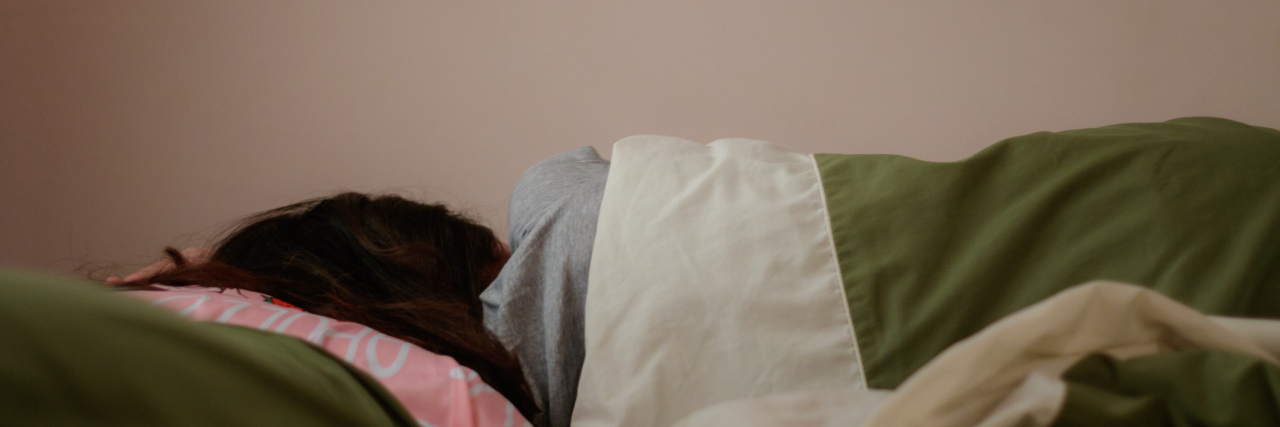Originally, I intended to title this post using the word “during.” That phrasing didn’t sit well with me and it was a challenge to parse out why. I realized that “during” didn’t fully capture the depth of what I mean. A flare isn’t something to solely be experienced. It engulfs you and causes both your mind and body to feel trapped.
- What is Fibromyalgia?
- What Are Common Fibromyalgia Symptoms?
These past two days have been a blur and as this flare works toward peak levels, I only feel more out of place. Writing this post is possible solely because my partner supported me unconditionally tonight, ensuring I could take the steps I needed to care for my body and get some temporary, partial relief.
It’s rare I would have the spoons available to write during a flare and I saw this as a unique chance to capture just a bit of what it’s like. Capturing it in words, however, is proving near impossible. I believe this is why you often see discussions of flares that seem surface level or clinical in nature – it’s rare we can capture it in the moment. So, instead of spending my spoons to battle brain fog and find elegant words to express a flare, I’ve decided to share some moments of my past two days.
1. This morning, I sat at my kitchen table and cried. My physical therapy office called and the gentle receptionist let me know that my physical therapist was out sick today and I cried to for two reasons: sadness and relief. I knew missing this week may set back our progress. Yet, I also knew that his touch, no matter how careful he is, was going to set my skin on fire. Allodynia, pain upon being touched, is common for me and becomes severe in a flare.
2. Yesterday, I accidentally made myself physically sick. As waves of nausea came and went, I excused myself to a bathroom, wondering what had brought it on and guessing it was anxiety. When I arrived home, I realized that I had taken my medicine on an empty stomach… the food I could have sworn I had eaten was still on my table with its bright pink “remember me” Post-it on top. Brain fog intensifies as pain levels rise, making it common for me to forget important things like meetings, deadlines, and daily forms of self care (yes, even eating.)
3. This past evening, I arrived to the small group I co-lead for my ministry. It’s one of the highlights of my week. My best friend assisted me in sitting in “the throne” (it’s really just a large chair, but nothing wrong with feeling special!) and folks began chatting about their weeks so far. Walking from work to small group, even with the support of my cane, had stripped me of what little energy remained and my fatigue set in so strongly I forgot to lead the parts assigned to me. I’m blessed with community that steps up when I need, because I believe interdependence is a key part of experiencing chronic illness. They led my sections wonderfully.
4. Today, I yelled at a friend. I had solid reason for being frustrated and both she and I knew this was true. She and I both also knew that yelling was an unacceptable response. Pain makes you angry, anxious and sad. Being in pain is isolating in ways that shake me to the core of my being, making me feel distant and defensive. I’ve apologized and been forgiven, but I always live in fear of how my pain will impact each relationship I have.
5. Now, it is 10:45 p.m. I am more than tired enough to sleep. Being in pain is exhausting, even if you do not move. Yet, here I am: blogging with Netflix in the background. Painsomnia is a brutal part of a flare, because it perpetuates the continuation of it. You hurt so badly you cannot sleep. Perhaps you can’t even lie down. Lack of sleep, unfortunately, increases pain, fatigue, brain fog, allodynia and more. Not sleeping makes a flare worse. A flare makes sleeping impossible.
No words will do justice to the experience of a flare. No words can capture the pain that radiates every limb of your body, the fatigue that makes holding your eyelids open feel insurmountable, or the emotional labor it takes to simply make it from minute to minute. No words can capture the anxiety that rises when you admit to yourself, “It may have ended, but it will happen again.”
I will be the first to admit that being chronically ill has brought beautiful things into my life. It is an identity I am proud of. No matter how many push back on this idea, I believe I can claim that pride while simultaneously admitting this is hard.
If it’s hard for you, too – I hear you. I’m in it with you. I’m wishing you all the spoons and many gentle hugs.
MORE ABOUT FIBROMYALGIA:
Fibromyalgia, a chronic illness with three main symptoms — widespread pain, chronic fatigue and cognitive trouble. Fibromyalgia is a complicated illness that’s not well understood. In the past, it was mischaracterized as a mental health disorder. Even today, some doctors wave off fibro symptoms as being “all in your head.” This isn’t the case. Read The Mighty’s comprehensive guide to fibromyalgia here. Click here to join our fibro community and connect with people who get it.
Getty photo by tsingha25

